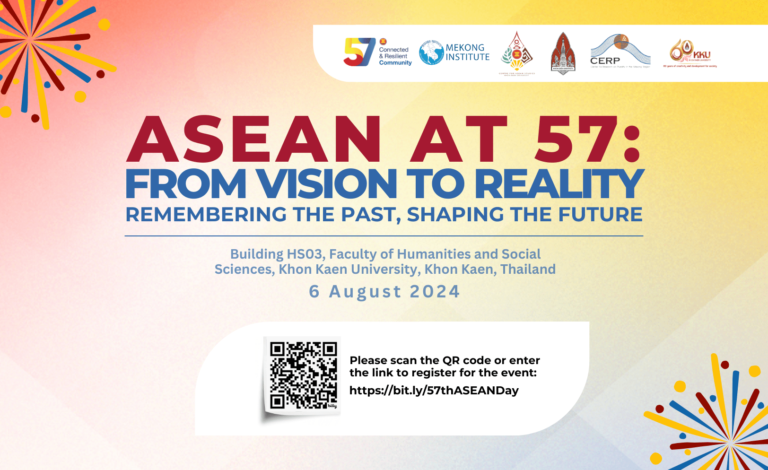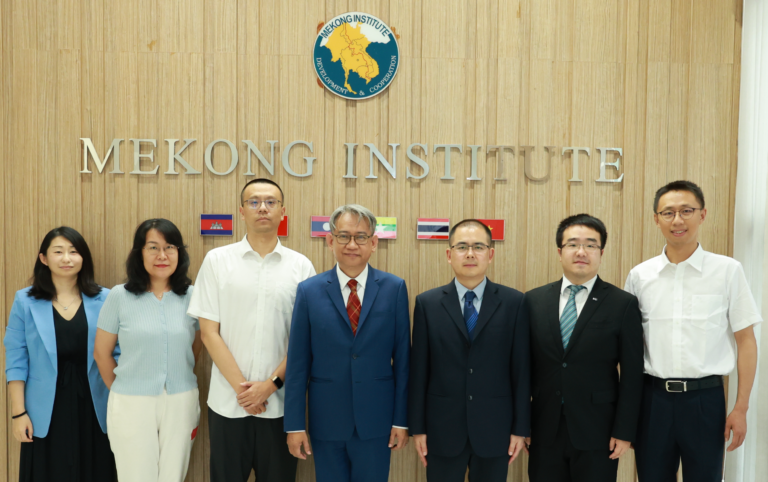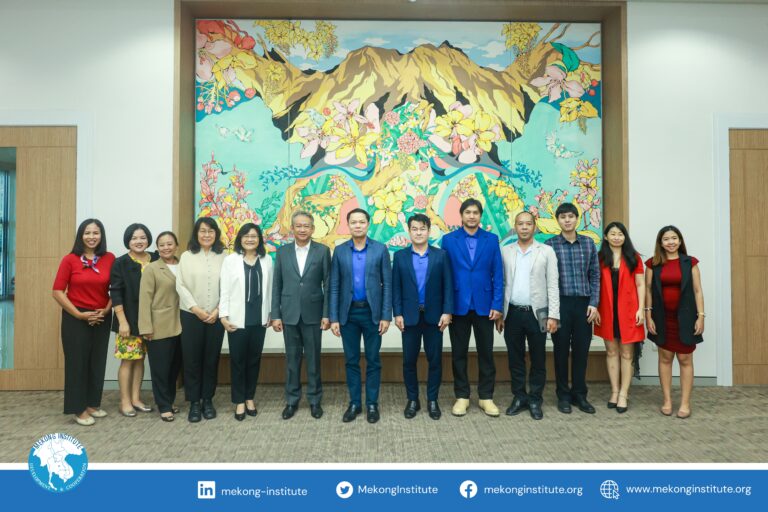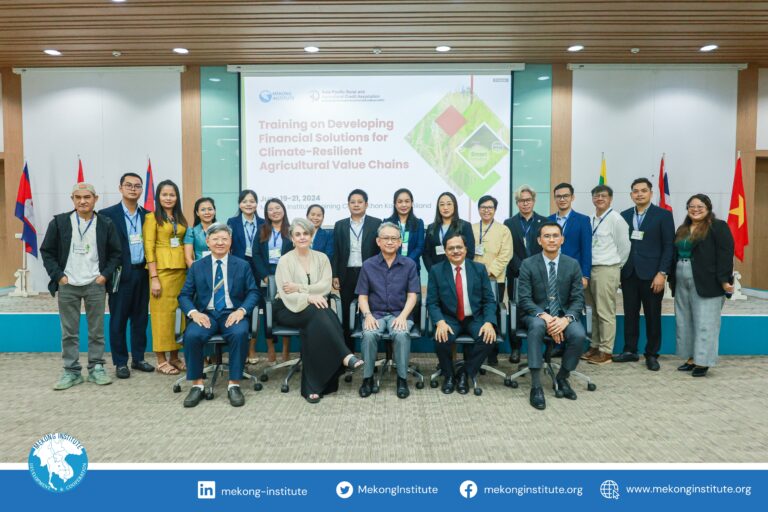In a landmark high-level meeting in Bangkok, stakeholders from Cambodia, Lao PDR, Myanmar, and Viet Nam (CLMV) celebrated the gains and discussed the future of Mekong Institute’s (MI) food safety project, Promoting Safe Food for Everyone or PROSAFE. The regional event welcomed nearly 80 participants, including key government officials from CLMV, marking the culmination of the second phase of MI’s biggest capacity-building project for the last five and a half years.
With the support of the New Zealand Aid Programme (NZAP), the end-of-project event provided a platform for forward-looking conversations on food safety promotion. It reported on the specific ways PROSAFE had contributed to the strengthening of the food safety agenda in CLMV, and opened discussions on policy directions and future partnerships, drawing from lessons learned and best practices in project implementation.
In his introductory remarks, Mr. Suriyan Vichitlekarn, Executive Director of MI, urged attendees not to lose sight of how “food safety will continue to be an important topic of the region’s agrifood sector in the years to come”. He said that, despite the conclusion of PROSAFE, food safety will remain in the region’s sustainable development agenda, especially with the knowledge gained and the network built over the years. Food safety is also a priority area in MI’s strategic plan for 2021 to 2025. “The project gains may be expanded to opportunities that would further benefit farmers, SMEs, and traders,” Mr. Vichitlekarn added.
Dr. Narongchai Akrasanee, Chairman of the MI Steering Committee, likened PROSAFE to a second episode of a TV series and expressed optimism that “episode three is coming next.” He noted how food safety assurance is increasingly becoming a requirement of export markets, driving regional stakeholders to tackle challenges in the agrifood industry through relevant policies and capacity-building activities. “I hope we have learned from each other the best practices we have developed so that we may effectively protect our people against food safety risks and position CLMV and the rest of the GMS as a haven for safe, nutritious, delectable, and sustainably produced food.”
Speaking on behalf of the New Zealand Ambassador to Thailand, Deputy Head of Mission Ms. Abigail Poole described the event as the beginning of a lasting legacy. She expressed appreciation for the active participation of CLMV’s public and private sector representatives, applauding their commitment to a future marked by safer food practices and continued partnerships.
In a keynote address, Dr. Gyanendra Gongal, Coordinator for the World Health Organization (WHO) Asia-Pacific Quadripartite One Health Secretariat and Senior Public Health Officer for Food Safety, Zoonoses, and One Health at the WHO South-East Asia Regional Office (SEARO), stressed the critical role of risk management and comprehensive food chain information in addressing food safety issues. He also presented WHO’s global strategy for food safety for 2022 to 2030, which seeks to strengthen food safety systems and cooperation worldwide.
Ms. Maria Theresa Medialdia, PROSAFE Project Manager and Director of MI’s Agricultural Development and Commercialization Department, presented the highlights and accomplishments of the project. “Beyond training and outreach programs, PROSAFE produced food safety champions who continuously advocate for safer food in CLMV. The project forged stronger partnerships among countries and between public and private sectors, charting demonstrable changes in food safety management systems and food standards compliance,” said Ms. Medialdia. “With the capacitated network of CLMV food safety stakeholders, we did not only address food safety issues in one stage of the supply chain, but we addressed food safety issues along the supply chain.”
PROSAFE delivered 50 regional training programs, improving the food safety knowledge and skills of 1,286 participants from CLMV and almost 40,000 other food stakeholders who attended the nearly 600 localized training courses organized by PROSAFE alumni.
Over the course of PROSAFE, 230 private firms – mostly SMEs – improved their food safety management systems and operations. Across CLMV, 52 government regulations and guidelines on food safety were developed, while over 30 academic curricula for food safety and agricultural education were strengthened. PROSAFE also contributed to broader public awareness of food safety through 577 awareness-raising activities, and food safety stories produced and published on various media platforms.
“Through the regional training programs we conducted, there was an increase in food safety knowledge and skills of relevant stakeholders in different stages of the agri-food supply chain. There are skilled and capable trainers delivering food safety training in CLMV. Over the years, this will have multiplier effects because they will continue to deliver food safety training programs in their respective countries,” Ms. Medialdia elaborated on the specific outcomes of PROSAFE.
Among high-level officials who graced the event were: H.E. Mr. Sao Vannsereyvuth, Undersecretary of State and Chairman of the Cambodia CITES Management Authority; H.E. Mr. Sok Silo, Secretary-General of Cambodia’s Council for Agricultural and Rural Development; H.E. Mr. Phan Oun, Director-General of Cambodia’s Consumer Protection, Competition and Fraud Repression Directorate-General; H.E. Mr. Chan Sopha, Director-General of the Institute of Standards of Cambodia; and Dr. Bounxou Keohavong, Director-General of Lao PDR’s Food and Drug Department.
The event presented to the participants the results of an independent evaluation of the PROSAFE project. It also tackled the project’s prospects and future directions through workshops and plenary presentations. To cap off the program, Mr. Vichitlekarn and Ms. Medialdia led the unveiling of a new set of PROSAFE knowledge products meant to support food safety advocates in further advancing the food safety agenda in CLMV. The event also featured a study tour at Central Lab Thai, enabling the participants to gain more insights into the food safety control system in Thailand.







